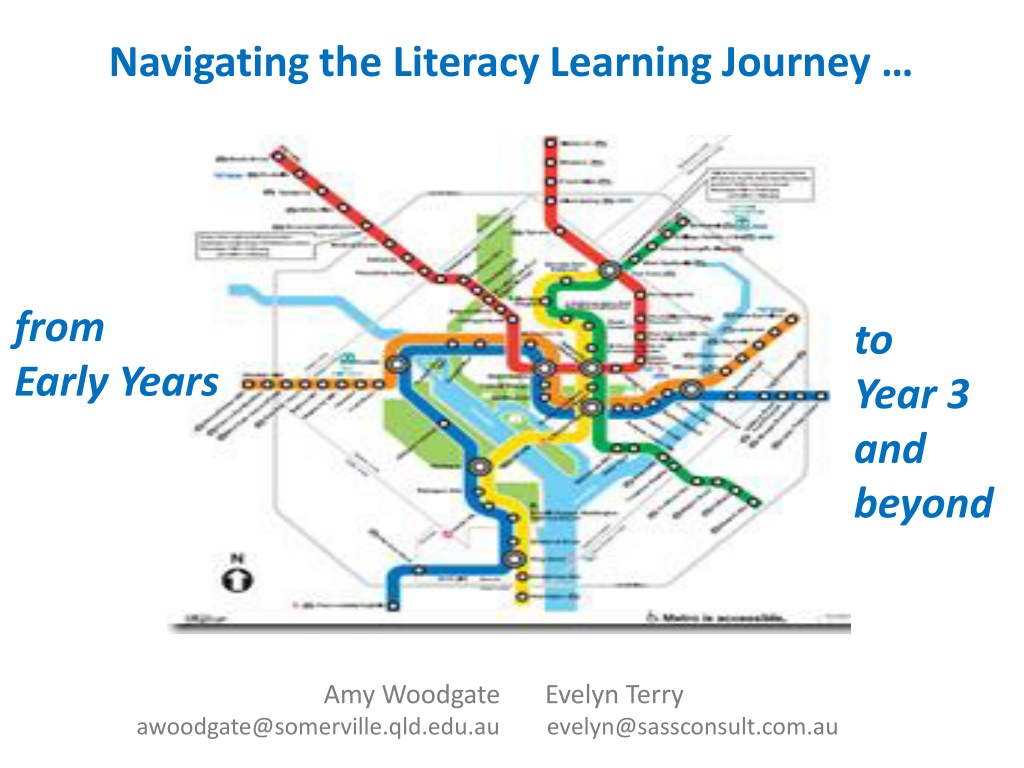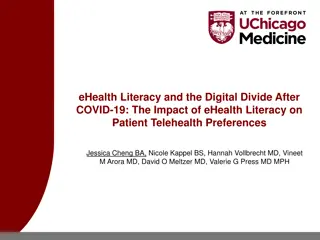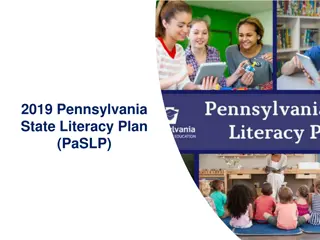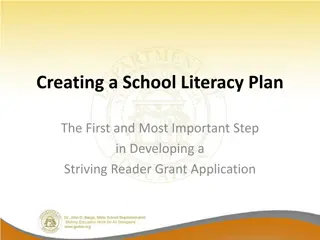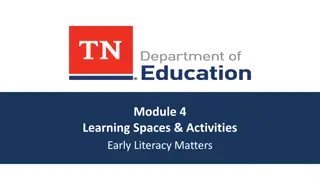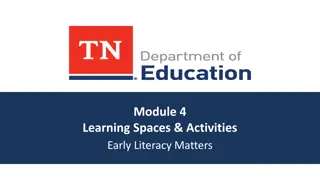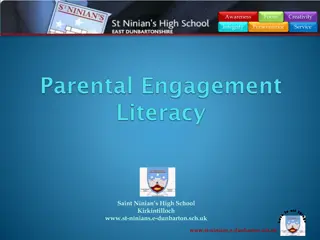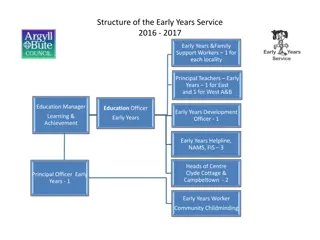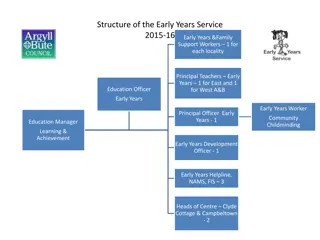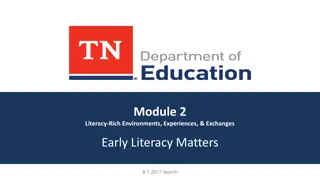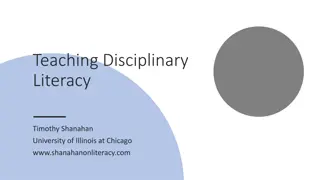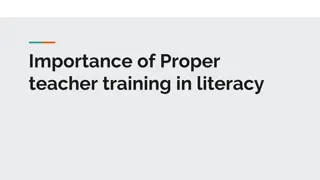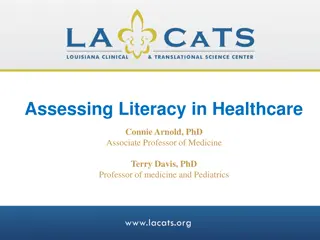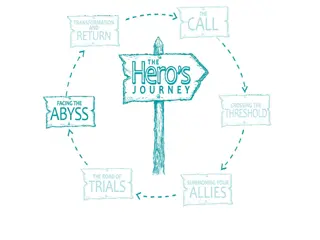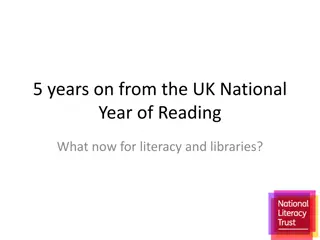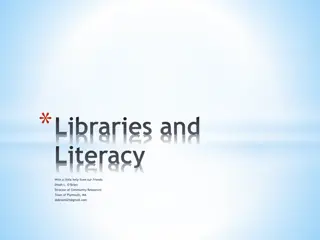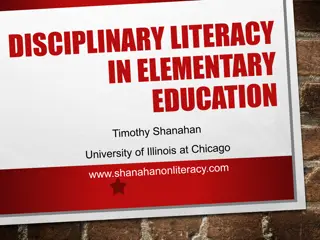Navigating Literacy Learning Journey: Early Years to Year 3 & Beyond
Explore the essential skills required for literacy development from early years to year 3 and beyond, focusing on print-based and language-based core literacy skills, functional literacy conventions of writing, and the oral and written language scales. Address challenges in consolidating spelling and punctuation for functional literacy tasks.
Download Presentation

Please find below an Image/Link to download the presentation.
The content on the website is provided AS IS for your information and personal use only. It may not be sold, licensed, or shared on other websites without obtaining consent from the author. Download presentation by click this link. If you encounter any issues during the download, it is possible that the publisher has removed the file from their server.
E N D
Presentation Transcript
Navigating the Literacy Learning Journey from Early Years to Year 3 and beyond Amy Woodgate Evelyn Terry awoodgate@somerville.qld.edu.au evelyn@sassconsult.com.au
The fussle grocker flebbed lapily to a roosh.
The fussle grocker flebbed lapily to a roosh. What flebbed? How did he fleb? Where did he fleb? What sort of grocker was he?
Print based and language based core literacy skills Print based core literacy skills Phonological awareness skills Letter sound correspondence Letter formation Spelling Language based core literacy skills Word choice .. very specific Language structures rules Syntax rules Punctuation Coherence
What were we seeing? TASK 1 Write a sentence about a picture: The two girls are playing a great game of football. TASK 2 Retell a story: Jeny was so exited she got her very own shiney red bike she dident want her frends watching and laghfing so she cept her bike in her back yard she practes every arfternon then she rid to school with all her frendes.
OR is the problem in the combination of the print based and language based literacy skills that are required for functional literacy tasks? Are we not consolidating the spelling & punctuation enough?
Functional Literacy Conventions of Writing Linguistics Content Letter formation Spelling Punctuation Use of language forms Use of adjectives Use of phrases Verb tense Sentence structure Appropriate subject matter Word choice Coherence Detail
OWLS - Oral and Written Language Scales Oral instructions - age appropriate in vocabulary, sentence length, subject matter Range of written language skills structured, open ended Examines the application of skills taught in classroom Examines writer s ability to organise ideas Based on well defined theory of language High correlation / consistency/reliability
OWLS Assessment Results Conventions Linguistics Sentence Structure Content PERCENTILE SCORES Year 1 25.6 Year 2 45 Year 3 38 Year 4 54 Conventions Linguistics Sentence Structure 78 29 68 59 66 46 79 50 Content 62 83 86 90
The current journey a complex map PREP All Stations All stops YEAR 3 Train delayed YEAR 2 Compass points shifting is what is in our suitcase at the end of Year 2 what we need to reach the platform at Year 3? YEAR 4 Missed the connection YEAR 1 Express to all stations
Classroom practice changes Increase student understanding of oral vs written language. Explicitly teach of the language based literacy skills esp. sentence structure Consolidate the application of the linguistic elements in functional literacy tasks Teach language and print based literacy skills across curriculum areas
SomeReferences Australian Curriculum www.australiancurriculum.edu.au/English/Curriculum/F-10 Carrow-Woolfolk, E. OWLS - Oral and Written Language Scales (1996) American Guidance Service, Circle Pines, MN. Crevola, C, Hill, P. & Fullan, M. (2006). Assessment for Learning in Action. Orbit, Vol 36, No 2, 2006 Love E. & Reilly S. (2006) Words! Words! Words! In Acquiring Knowledge in Speech, Language and Hearing, Volume 8,Number 3, 2006. Van Barneveld, C. (2008). Using Data to improve Student Achievement. What Works? Research into Practice www.edu.gov.on.ca/eng/literacynumeracy/inspire/research/whatWorks.html Van Kraayenoord, CE, Barnett, J., Roberts, D., & Moni, K.B. (1999). Literacy assessment and student diversity; An Australian case study. International Journal of Disability, Development and Education, 46, 51-70. Westby Carol (1985) Learning to Talk Talking to Learn. In Simon C.S. (Ed) Communication skills and classroom success: Therapy methodologies for language learning disabled students. College Hill, San Diego, pp 182 213 Westwood Peter (2009) Arguing the case for a simple view of literacy assessment. Australian Journal of Learning Difficulties, Vol. 14, No. 1, May 2009, 3-15 Engaging in and Exploring Writing www.decs.sa.gov.au/literacy OLSEL Research Report www.olsel.catholic.edu.au www.pld_literacy.org/Language-Literacy-Link-Milestone.html
